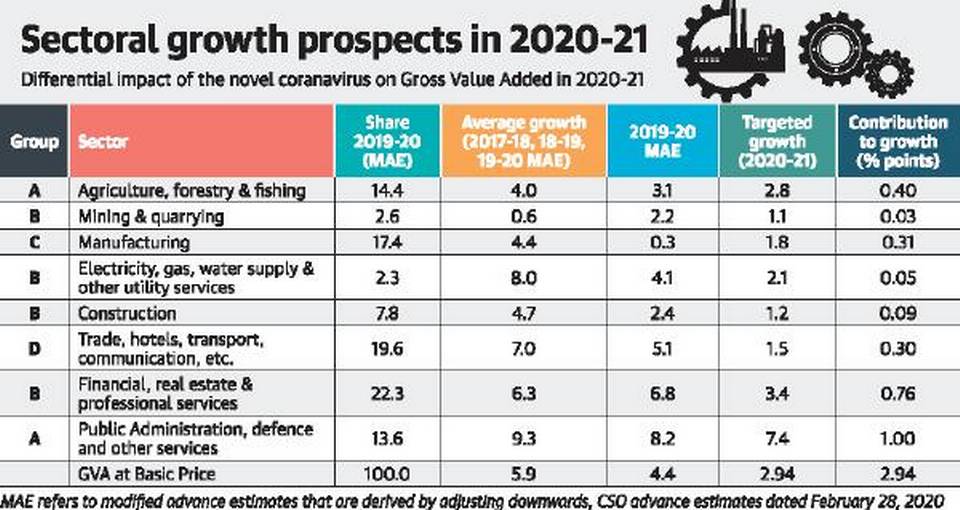Introduction
- Various institutions have assessed India’s growth prospects for 2020-21 ranging from 0.8% (Fitch) to 4.0% (Asian Development Bank).
- This wide range indicates the extent of uncertainty and tentative nature of these forecasts.
- The International Monetary Fund (IMF) has projected India’s growth at 1.9%, China’s at 1.2%, and the global growth at (-) 3.0%.
The actual growth outcome for India would depend on:
- the speed at which the economy is opened up;
- the time it takes to contain the spread of virus,
- the government’s policy support.
Growth prospects

- In 2019-20, which would serve as the base year, India may show (Gross Value Added) GVA growth of about 4.4%
- GVA is divided into eight broad sectors, and although all sectors have been disrupted, some may be affected less than the others.
We divide the output sectors in four groups:
Group A – Agriculture and allied sectors, and Public administration, Defence and other services.
- In the case of agriculture, rabi crop is currently being harvested and a good monsoon is predicted later in the year.
- Despite some labour shortage issues, this sector may show near-normal performance.
- The public and defence services have been nearly fully active, with the health services at the forefront of the COVID-19 fight.
- For the group A sectors, it may be possible to achieve 90% of the 2019-20 growth performance.
Group B – Mining and Quarrying, Electricity, Gas, Water supply and other Utility services, Construction, and Financial, Real estate and Professional services.
- These four sectors may suffer average disruption showing 50% of 2019-20 growth performance.
Group C – Manufacturing.
- Manufacturing has suffered significant growth erosion in 2019-20. It is feasible to stimulate this sector by supporting demand.
Group D – Trade, Hotels, Transport, Storage and Communications.
- This sector may be able to show 30% of 2019-20 growth performance.
GVA Forecast
- Considering these four groups together, a GVA growth of 2.9% is estimated for 2020-21.
- Realising this requires strong policy support, particularly for the manufacturing sector which has a weight of 17.4%.
- It is also based on the assumption that the Indian economy may move on to positive growth after the first quarter.
- In the first quarter, GVA growth will be negative.
Calibrating policy support
- Monetary policy initiatives undertaken so far include a reduction in the repo rate to 4.4%, the reverse repo rate to 3.75%, and cash reserve ratio to 3%.
- The Reserve Bank of India has also opened several special financing facilities.
- These actions will have a positive impact on output only after the lockdown is lifted.
- These measures need to be supplemented by an appropriate fiscal stimulus.
- With lower petroleum prices, fertilizer and petroleum subsidies may be reduced.
- These expenditure cuts are contemplated to keep the fiscal deficit under some control.
On fiscal deficit
Fiscal stimulus can be of three types:
- Relief expenditure for protecting the poor and the marginalised
- Demand-supporting expenditure for increasing personal disposable incomes or government’s purchases of goods and services, including expanded health-care expenditure imposed by the novel coronavirus
- Bailouts for industry and financial institutions.
The Centre’s budgeted fiscal deficit of 3.5% of GDP may have to be enhanced substantially to make up for the shortfall in budgeted revenues; account for a lower than projected nominal GDP for 2020-21, and provide for a stimulus.
Thus, the Centre’s fiscal deficit may increase to 6.0% of GDP.
Expenditure on construction of hospitals, roads and other infrastructure and purchase of health-related equipment and medicines require prioritisation.
Financing of the fiscal deficit poses a major challenge this year.
-Source: The Hindu



